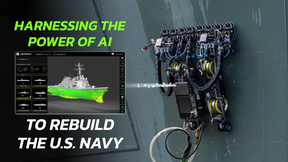Plan B Energy Storage (PBES) has announced a revolutionary new solution for enhancing the lifecycle benefits of marine battery systems.
‘CellSwap’ uses a new cost-effective method of retrofitting battery systems by replacing battery cells while leaving the rest of the installation intact. The process, called ‘re-coring’, saves up to 60 per cent of the costs of installing a new battery after a five year cycle, greatly enhancing lifecycle value.
CellSwap is a marine industry first that takes a ‘serviceable’ approach to battery components. While conventional batteries have to be recycled in their entirety, CellSwap enables battery cells to be replaced while almost all other components are preserved, including electric and cooling components, cell barriers and master battery unit (MBU).
This is achieved due to the large percentage of aluminium present in PBES batteries, which enables the battery to be disassembled every five years and the lithium-ion cells removed and replaced. This approach is not possible using conventional batteries, which consist of plastic components that are glued together, rendering them inaccessible, and are typically replaced every 10 years.
Commenting on the launch of CellSwap at Nor Shipping 2017, Brent Perry, CEO, PBES said: “After heavy investment in R&D, CellSwap represents genuinely revolutionary thinking in how marine batteries are designed and, consequentially, operated. By removing the need for full battery replacements, CellSwap delivers significant cost, efficiency and environmental benefits, while - crucially - enabling ship owners and operators to access the latest fast-moving innovations in battery cell technology when systems are replaced every five years, rather than having to wait for ten years.”
“CellSwap is a timely innovation and game changing for the shipping industry. With the International Chamber of Shipping (ICS) now formally recognising the need for a decarbonisation pathway that leads to fossil-free marine propulsion, CellSwap takes the lifecycle value and applicability of batteries – a proven and commercial viable clean technology solution – to a new, more accessible level. Through CellSwap we can deliver a faster return on investment from battery solutions, while meeting the most pioneering ship owners’ sustainability demands by removing the need for costly electronic waste recycling.”
The launch of CellSwap comes as PBES marks the production and installation of its 1,000th battery. Its batteries are installed on seven vessels, and PBES expects this number to rapidly increase in the coming years.
Brent added: “Our CellSwap solution is compatible with all vessel types. With the market for batteries rapidly evolving, it is our long-term aspiration to support the installation of CellSwap batteries on every vessel in the global fleet. In the short term we see CellSwap as particularly beneficial for the existing fleet of vessels with electronic batteries, which will require replacement in the next two to five years.”


